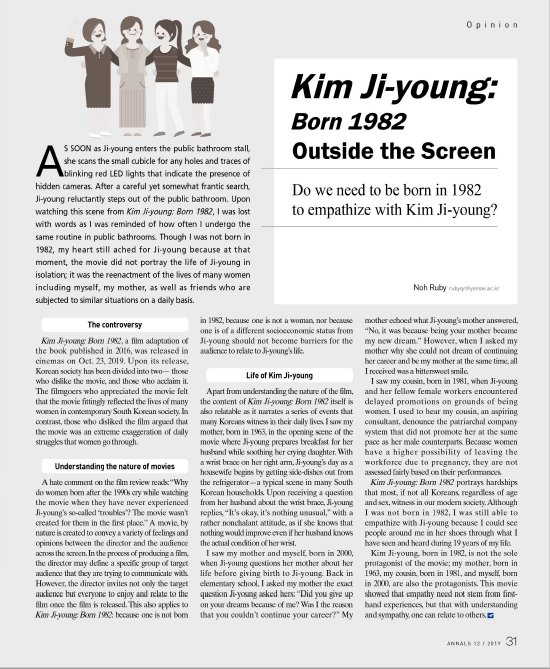Do we need to be born in 1982 to empathize with Kim Ji-young?

AS SOON as Ji-young enters the public bathroom stall, she scans the small cubicle for any holes and traces of blinking red LED lights that indicate the presence of hidden cameras. After a careful yet somewhat frantic search, Ji-young reluctantly steps out of the public bathroom. Upon watching this scene from Kim Ji-young: Born in 1982, I was lost with words as I was reminded of how often I undergo the same routine in public bathrooms. Though I was not born in 1982, my heart still ached for Ji-young because at that moment, the movie did not portray the life of Ji-young in isolation; it was the reenactment of the lives of many women including myself, my mother, as well as friends who are subjected to similar situations on a daily basis.
The controversy
Kim Ji-young: Born in 1982, a film adaptation of the book published in 2016, was released in cinemas on Oct. 23, 2019. Upon its release, Korean society has been divided into two— those who dislike the movie, and those who acclaim it. The filmgoers who appreciated the movie felt that the movie fittingly reflected the lives of many women in contemporary South Korean society. In contrast, those who disliked the film argued that the movie was an extreme exaggeration of daily struggles that women go through.
Understanding the nature of movies
A hate comment on the film review reads: “Why do women born after the 1990s cry while watching the movie when they have never experienced Ji-young’s so-called ‘troubles’? The movie wasn’t created for them in the first place.” A movie, by nature is created to convey a variety of feelings and opinions between the director and the audience across the screen. In the process of producing a film, the director may define a specific group of target audience that they are trying to communicate with. However, the director invites not only the target audience but everyone to enjoy and relate to the film once the film is released. This also applies to Kim Ji-young: Born in 1982: because one is not born in 1982, because one is not a woman, nor because one is of a different socioeconomic status from Ji-young should not become barriers for the audience to relate to Ji-Young’s life.
Life of Kim Ji-young
Apart from understanding the nature of the film, the content of Kim Ji-young: Born in 1982 itself is also relatable as it narrates a series of events that many Koreans witness in their daily lives. I saw my mother, born in 1963, in the opening scene of the movie where Ji-young prepares breakfast for her husband while soothing her crying daughter. With wrist brace on her right arm, Ji-young’s day as a housewife begins by getting side-dishes out from the refrigerator—a typical scene in many South Korean households. Upon receiving a question from her husband about the wrist brace, Ji-young replies, “It’s okay, it’s nothing unusual,” with a rather nonchalant attitude, as if she knows that nothing would improve even if her husband knows the actual condition of her wrist.
I saw my mother and myself, born in 2000, when Ji-young questions her mother about her life before giving birth to Ji-young. Back in elementary school, I asked my mother the exact question Ji-young asked hers: “Did you give up on your dreams because of me? Was I the reason that you couldn’t continue your career?” My mother echoed what Ji-young’s mother answered, “No, it was because being your mother became my new dream.” However, when I asked my mother why she could not dream of continuing her career and be my mother at the same time, all I received was a bittersweet smile.
I saw my cousin, born in 1981, when Ji-young and her fellow female workers encountered delayed promotions on grounds of being women. I used to hear my cousin, an aspiring consultant, denounce the patriarchal company system that did not promote her at the same pace as her male counterparts. Because women have a higher possibility of leaving the workforce due to pregnancy, they are not assessed fairly based on their performances.
Kim Ji-young: Born in 1982 portrays hardships that most, if not all Koreans, regardless of age and sex, witness in our modern society. Although I was not born in 1982, I was still able to empathize with Ji-young because I could see people around me in her shoes through what I have seen and heard during 19 years of my life.
Kim Ji-young, born in 1982, is not the sole protagonist of the movie; my mother, born in 1963, my cousin, born in 1981, and myself, born in 2000, are also the protagonists. This movie showed that empathy need not stem from first-hand experiences, but that with understanding and sympathy, one can relate to others.
Noh Ruby
rubyqr@yonsei.ac.kr

